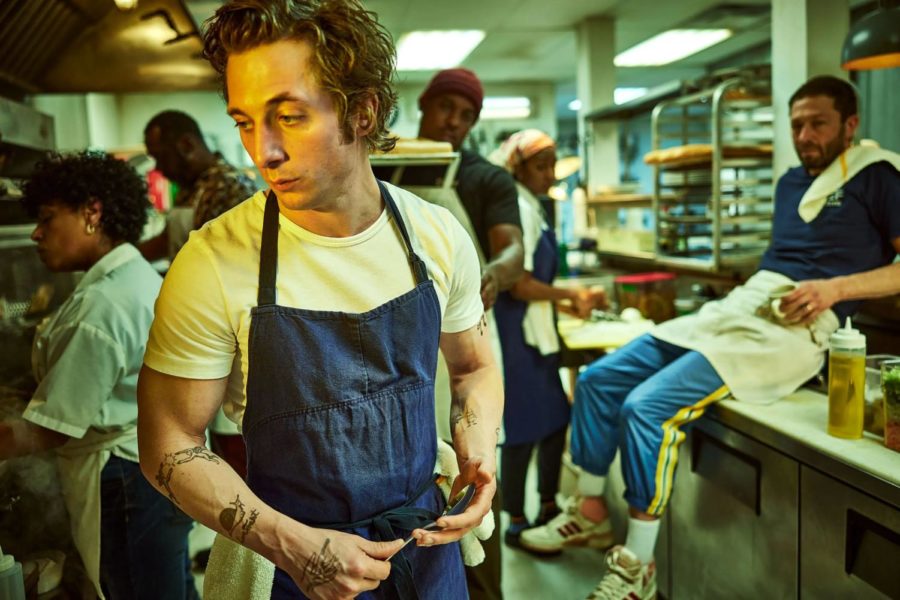FX’s “The Bear” dishes out the heat and drama of restaurant life
Combining the order of a restaurant kitchen and the chaos of human relationships, FX’s “The Bear” follows chef Carmy Berzatto as he returns to his family restaurant after the tragic death of his brother.
September 9, 2022
In the volatile, fast-paced world of a chef, even chaos needs to be orderly. Whether you’re broiling a beef shoulder, sautéing a medley of vegetables or emulsifying a variety of sauces, every move you make has to be on time and in line with the rest of the kitchen to keep the proverbial pot from boiling over.
But, with a myriad of ingredients in play, what happens if you add in a helping of disorder to your staff, a smidge of economic turmoil to your restaurant and a dash of emotional trauma to your head chef? That’s what FX’s show “The Bear” examines in its eight-episode season.
The series, which came direct-to-streaming on Hulu in June, follows Carmen “Carmy” Berzatto (Jeremy Allen White), a highly successful rising chef, as he returns home to his family-owned restaurant in Chicago after the previous owner—his brother Michael (Jon Bernthal)—had an untimely death. Left to Carmy in Michael’s will, the Italian sandwich shop called The Original Beef of Chicagoland, or simply just The Beef, is a failing, grimy mom and pop locale that mainly caters to the faithful residents of the local neighborhood, River North. And much like the clientele, the veteran staff members at The Beef are unchanging in their ways and see Carmy’s recent takeover of the place as more of a threat than a new opportunity.
It doesn’t help, then, that from the start of the series Carmy is set on making something out of the restaurant and tries to implement his vast culinary knowledge in the newly acquired kitchen. But this isn’t the only strain that’s put on the staff, as Carmy also brings on a new staff member, Sydney (Ayo Edebiri), who shares a similar passion and cooking expertise as Carmy, much to the dismay of practically everyone else.
With all of this dysfunction going on inside the shop, the underlying grief surrounding Michael’s death and the immense pressure that’s put on Carmy’s shoulders carry over into everything else in the show. Now in charge of a rundown restaurant, Carmy is left trying to figure out the business side of things while also dealing with the sorrow that he and his sister, Sugar (Abby Elliot), feel about their brother. These sentiments are further complicated by the fact that Carmy has returned to Chicago estranged from those who once knew him, and his cold, isolated demeanor—due to his own inner struggles—continuously increases this feeling.
Now, aside from the premise of the series and the intrigue that it inspires, one thing that “The Bear” does masterfully is capture what I imagine to be the reality of working in a restaurant’s kitchen. It’s full of high intensity, rapid action shots of the food sizzling to perfection as the staff darts in between stations. There are longer tracking shots that follow one of the characters as they hurry around the kitchen, constantly calling out some common restaurant lingo like “behind!” when they’re passing someone working at a station or “corner!” as they round a bend.
Equally well-voiced in the show is the slew of insults, yelling and profanity that surge around the kitchen faster than the smells do. Most of these come from Richie (Ebon Moss-Bachrach), Michael’s long-time best friend and the de facto leader of the original staff, who is quick to voice his discontent with The Beef’s new regime whenever he gets the chance.
But it’s in this raw emotion and the speed at which everything is occurring that makes the show feel palpable. It’s this drive and passion for the way that things should be run that makes you feel how dedicated the staff are to the restaurant. And through all the conflict and the bickering, you can sense how close-knit and loving all of the characters are with each other; so much so that they genuinely resemble more of a diverse, dysfunctional family than a kitchen crew.
At its core, “The Bear” dramatically shows how turbulent trying to run a restaurant can be in the face of both internal and external hardships. It’s in the nuance of the show—its acting and its situational complexities—that the dark comedic nature of “The Bear” appears in full force, causing you to both laugh and despair within the same scene. And it’s by feeling these highs and lows that you get drawn into the storyline and find yourself binging the whole season in the blink of an eye. So, if you’re looking for a chaotic ride full of loud-mouthed characters dealing with all kinds of tension in a deteriorating restaurant, then checking out “The Bear” might prove to be some food for thought.



